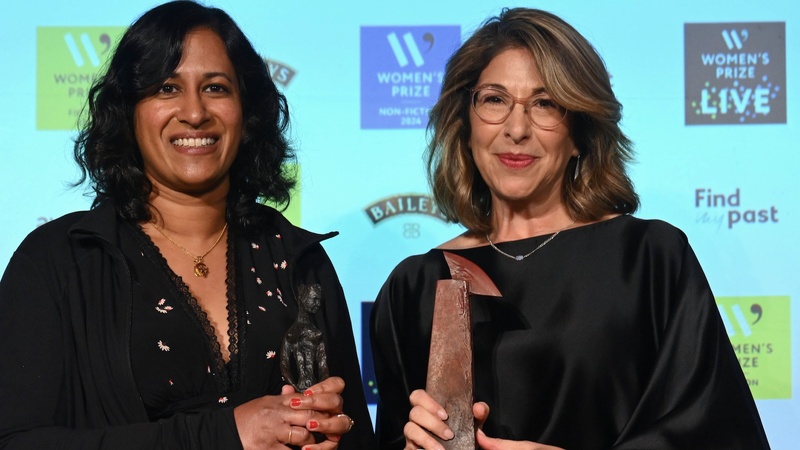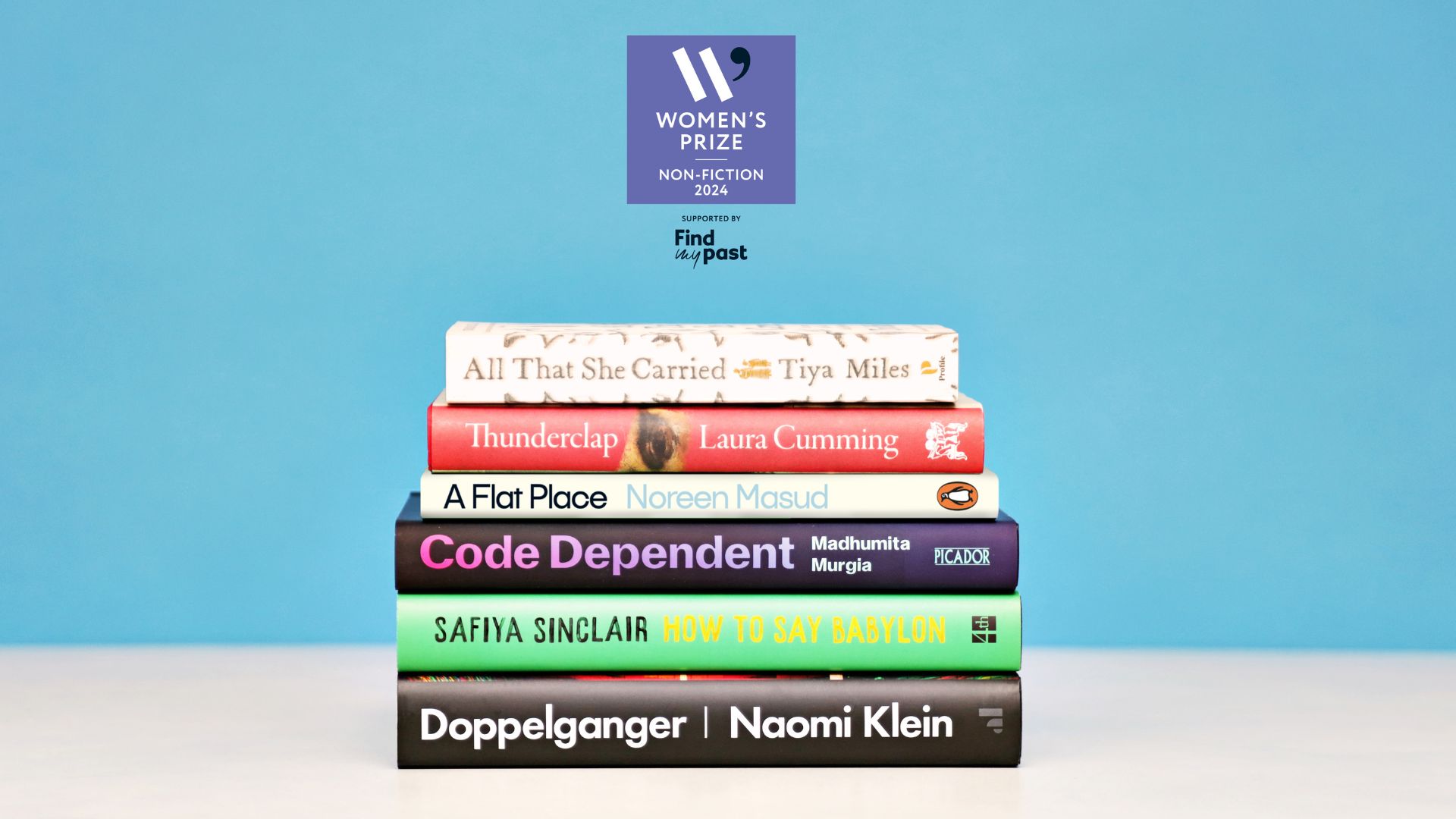You are viewing your 1 free article this month. Login to read more articles.
V V Ganeshananthan and Naomi Klein triumph as Women's Prize winners
The Women’s Prize for Fiction 2024 has been awarded to American author V V Ganeshananthan for her “masterpiece of historical fiction", Brotherless Night (Viking). Meanwhile, The Women’s Prize for Non-Fiction was awarded in its first year to Canadian author and activist Naomi Klein, for Doppelganger: A Trip into the Mirror World (Allen Lane). The results mean books published by Penguin Random House scooped both awards on the night.
Ganeshananthan’s novel, published by Viking, arrived almost 15 years after her debut, Love Marriage (W&N), was longlisted for the Women’s Prize in 2008. Brotherless Night is set mostly in Jaffna, Sri Lanka, depicting a family fractured by civil war told from the first-person perspective of a young woman, Sashi, who wants to be a doctor but whose ambitions are thwarted by civil unrest and whose brothers join the Tamil Tiger militants.
In its 29th year, Ganeshananthan was awarded the Women’s Prize bronze statuette, known as the “Bessie”, at a live ceremony in Bedford Square Gardens, central London tonight, with judges hailing the author’s “clear-eyed moral scrutiny” and “spellbinding storytelling".
Ganeshananthan triumphed over fellow shortlistees Anne Enright, Claire Kilroy, Isabella Hammad, Kate Grenville and Aube Rey Lescure. She takes home a cheque for £30,000 along with a trophy created and donated by the artist Grizel Niven.
Speaking to The Bookseller after winning the award, Ganeshananthan said that the shortlisted books this year were connected by their exploration of "the porousness of borders, and the complexity of what it means to belong to a space, or not belong to a space". The author added that she has been "impressed" with the way her book — and the rest of the shortlisted titles — have been received in the UK. "The depth of engagement, the enthusiasm, the wholeheartedness is wonderful," she said. "Britain is part of Sri Lanka’s history because of [the] colonisers in Sri Lanka, so people’s familiarity with the history is actually different here."
Monica Ali, chair of judges for the Women’s Prize for Fiction, said: “Brotherless Night is a brilliant, compelling and deeply moving novel that bears witness to the intimate and epic-scale tragedies of the Sri Lankan civil war.”
She added: “In rich, evocative prose, Ganeshananthan creates a vivid sense of time and place and an indelible cast of characters. Her commitment to complexity and clear-eyed moral scrutiny combines with spellbinding storytelling to render Brotherless Night a masterpiece of historical fiction.”
Canadian author and activist Naomi Klein won the inaugural Non-Fiction Award for Doppelganger, an exploration of truth and polarisation in politics prompted by her experience of being repeatedly confused with the author Naomi Wolf .
Professor Suzannah Lipscomb, chair of judges for the Women’s Prize for Non-Fiction, said: “This brilliant and layered analysis demonstrates humour, insight and expertise. Klein’s writing is both deeply personal and impressively expansive.
“Doppelganger is a courageous, humane and optimistic call-to-arms that moves us beyond black and white, beyond Right and Left, inviting us instead to embrace the spaces in between.”
Klein was shortlisted for this year’s prize alongside Madhumita Murgia, Laura Cumming, Noreen Masud, Tiya Miles and Safiya Sinclair. Klein received a cheque for £30,000 and a limited-edition artwork known as the “Charlotte”, both gifted by the Charlotte Aitken Trust. The Women’s Prize for Non-Fiction is sponsored by the family tree company Findmypast.
Klein praised the new non-fiction prize for its work in supporting women writers, and said she was not aware of a similar award of this scale in North America. "It’s very nice to know this is kicking off a new tradition, and it’s sending a message to booksellers, publishers [and] agents, and I love that I get to be part of kicking it off," she said. Speaking to The Bookseller about the funding of prizes and festivals, Klein added: "My first book, No Logo [Fourth Estate], dealt with some of the troubling dynamics that happen when you don’t fully fund the arts: arts institutions have to go to corporate sponsorship. And then that has an effect on the culture, because the people want to criticise the sponsor, then the cultural institution [...] is in the situation of having to potentially silence voices, which they don’t want to do, they’re here to celebrate voices; it’s an argument for fully funding the arts."
Addressing the issue of Baillie Gifford, Klein said that "people are feeling really desperate" about foreign policy and war in Gaza, and are looking for way to affect change. "Obviously this is not how any of us want to be making foreign policy, we want our governments to have ethical foreign policy, but when they don’t, people look for whatever tools they can find," she said. "And a sponsorship of a literary festival or an endowment of a university is a place where people can find a little bit of power, a little bit of agency, and put a little bit of pressure. What we know from the past is that this can change policy, that’s what happened with the South African Divestment Campaign, which was the first movement I was ever a part of as a student."
She added: "The thing I have been quite troubled by is this discourse around bullying, this idea that people are being bullied, I don’t think that’s true. I was approached in an incredibly polite, collegial way, I wasn’t pressured. It was just an information campaign, and it was entirely up to the author to decide what they wanted to do. Some people decided to go and make a speech, some people decided not to go, some people decided not to do anything. I am in the business of informing people, I don’t think it’s bullying to inform people."

















